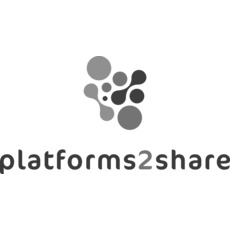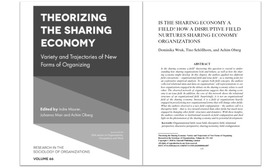platforms2share
Which opportunities do cooperative models and blockchain technology offer to the platform economy? What are other potential pathways toward a more sustainable platform economy?
Today, new digital platforms for sharing, swapping and other ways of collaborative consumption are widely associated with positive economic, ecological and social effects. At the same time, existing platforms like Airbnb and Uber are increasingly criticized in public debate for having negative effects on people, local economies and our planet. As a counter model, new decentral models combining alternative organizational forms (such as platform cooperatives) and new technologies (such as Blockchain technology) are discussed and tested. These and other alternative models promise to better reach social-ecological goals and offer potential to transform the sharing and platform economy.
News
i-share, platforms2shareNeue Termine gefunden: Das sechste i-share Symposium und zweite platforms2share Forschungskolloquium finden am 12./13. Oktober 2020 stattAufgrund der aktuellen Entwicklungen um Covid-19 werden wir das i-share Symposium und das platforms2share Forschungskolloquium auf den Herbst verschieben. Erfreulicherweise haben wir bereits Ersatztermine gefunden. Die Veranstaltungen finden am Montag/Dienstag, den 12./13. Oktober 2020 an der Universität Mannheim statt. | ||
i-share, platforms2shareHow is the sharing economy field structured? Dominika Wruk, Tino Schöllhorn and Achim Oberg address this question in their current publicationIn their exploratory study, the platforms2share researchers find that sharing organizations receive attention, resources and legitimation from a „disruptive field“ of organizations including tech-media and venture capitalists – a field that initiates and support technological innovation which potentially disrupt existing fields and industries. So far, the field pays attention to dominant models in the sharing economy such as Airbnb or Uber. The authors published the chapter in the renowned series „Research in the Sociology of Organizations“. | ||
i-share, platforms2shareWie ist das Feld der Sharing Economy strukturiert? Dieser Frage gehen Dominika Wruk, Tino Schöllhorn und Achim Oberg in ihrer aktuellen Veröffentlichung nachIn Ihrer explorativen Studie zum Feld der Sharing Economy finden die ForscherInnen heraus, dass Sharing Organisationen Legitimation und Ressourcen von einem „Disruptiven Feld“ an Organisationen (z.B. Tech-Medien, Venture Capitalists) erhalten, die technologische Innovationen anstoßen und stärken und damit bestehende Industrien und Felder disruptieren. Bisher schenkt dieses Feld insbesondere dominanten Sharing Organisationen (z.B. Airbnb, Uber) Aufmerksamkeit. Die Autoren veröffentlichen das Kapitel in der renommierten Serie „Research in the Sociology of Organizations“. | ||






